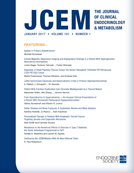-
Views
-
Cite
Cite
LAWRENCE N. PARKER, ELLIS R. LEVIN, ERIC T. LIFRAK, Evidence for Adrenocortical Adaptation to Severe Illness, The Journal of Clinical Endocrinology & Metabolism, Volume 60, Issue 5, 1 May 1985, Pages 947–952, https://doi.org/10.1210/jcem-60-5-947
Close - Share Icon Share
Abstract
During serious illness, there are characteristic increases in serum cortisol concentrations and urinary cortisol excretion. In the present studies, we investigated these changes i n glucocorticoid metabolism in relation to adrenal androgen metabolism, as measured by RIA of dehydroepiandrosterone (DHA) and DHA sulfate (DHAS). A group of 23 seriously ill men with various disorders, ill for a week or longer, was age-matched to a control group of 25 men, and the following changes were found: 1) basal serum cortisol concentrations were elevated n i the ill group (P < 0.001), 2) basal serum DHA and DHAS concentrations tended to be lower in the ill group (P < 0.1); 3) basal serum DHA to cortisol and DHAS to cortisol ratios were decreased in the ill group by 80.3‰ and 77.2‰, respectively (P < 0.001); 4) ACTH-stimulated serum cortisol concentrations increased by the same absolute amount in both groups, whereas the increase in stimulated DHA concentrations in the ill group was 57.2‰ less (P < 0.05), indicating a defect in ACTH-stimulated DHA reserve in serious illness; 5) basal daily unconjugated DHA excretion was lower in the ill group (P < 0.05); (6) basal daily cortisol excretion was higher in the ill group (P < 0.05); and 7) the basal daily urinary unconjugated DHA to cortisol ratio was 85.4‰ lower in the ill group (P < 0.001).
Recently, Zipser et al. described the entity of hyperreninemic hypoaldosteronism in the seriously ill. Their findings combined with our own indicate a relative shift in the metabolism of adrenal pregnenolone in serious illness away from mineralocor-ticoids and adrenal androgens and toward glucocorticoids. The cause of this change is unknown. We speculate that this shift of relative biochemical pathway predominance may be a factor necessary for survival during chronic severe stress.





